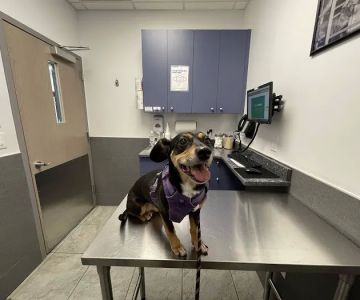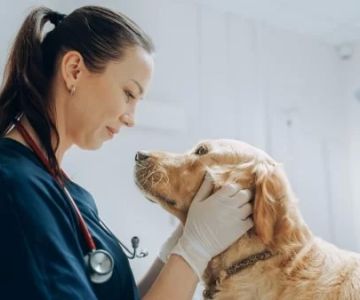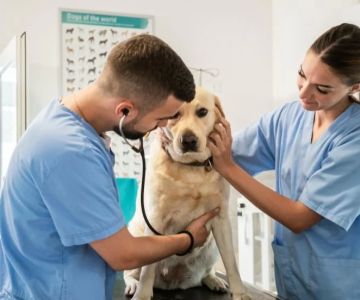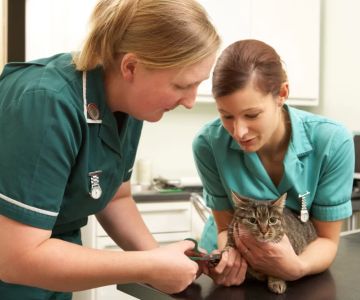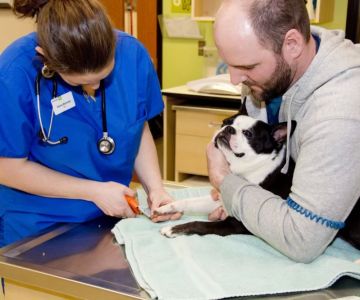What Is the Training Required for a Veterinarian: A Step-by-Step Guide to Becoming a Veterinarian
- 1. Overview of Veterinary Training
- 2. Educational Pathway to Becoming a Veterinarian
- 3. Hands-On Experience: Internships and Clinical Training
- 4. Specializations in Veterinary Medicine
- 5. The Licensing Process and Continuing Education
- 6. Real-World Experiences and Success Stories
- 7. Why Veterinary Training is Worth the Investment
1. Overview of Veterinary Training
Becoming a veterinarian is a rewarding journey that requires dedication, years of education, and practical experience. Veterinarians are the health professionals responsible for diagnosing and treating illnesses in animals, performing surgeries, and providing preventative care. Whether it's caring for household pets, livestock, or exotic animals, the training required for a veterinarian is extensive and highly specialized. This article will guide you through the education and training process that future veterinarians must undergo to succeed in this crucial profession.
2. Educational Pathway to Becoming a Veterinarian
The journey to becoming a veterinarian begins with obtaining the necessary educational background. Here is a breakdown of the education required:
- Undergraduate Degree: The first step to becoming a veterinarian is to earn a bachelor's degree. Most aspiring vets choose to major in biology, animal science, or a related field. While a specific major is not required, it is essential to take courses in biology, chemistry, physics, and mathematics to prepare for veterinary school.
- Veterinary School: After completing an undergraduate degree, students must attend a veterinary school accredited by the American Veterinary Medical Association (AVMA). Veterinary school typically lasts four years and includes a combination of classroom lectures, laboratory work, and hands-on clinical training.
- Degree Earned: Upon successful completion of veterinary school, graduates earn a Doctor of Veterinary Medicine (DVM) degree, which is required to practice as a licensed veterinarian in the United States.
3. Hands-On Experience: Internships and Clinical Training
While classroom education is essential, hands-on experience is a crucial aspect of veterinary training. In veterinary school, students participate in clinical rotations, where they work directly with animals under the supervision of experienced veterinarians. These rotations allow students to gain real-world experience in diagnosing, treating, and performing surgeries on animals. Additionally, many veterinary schools offer opportunities for students to participate in internships at animal hospitals, research facilities, and veterinary clinics, providing them with exposure to various specialties within veterinary medicine.
4. Specializations in Veterinary Medicine
After earning a DVM degree, some veterinarians choose to specialize in a specific area of veterinary medicine. Specializations allow veterinarians to become experts in certain fields, such as:
- Surgery: Veterinarians who specialize in surgery perform complex procedures to treat injuries, deformities, or illnesses in animals.
- Internal Medicine: Veterinarians in internal medicine diagnose and treat diseases affecting the internal organs of animals.
- Emergency and Critical Care: Some veterinarians choose to work in emergency care, providing life-saving treatments to animals in urgent need of medical attention.
- Exotic Animal Care: For those interested in working with exotic pets, including reptiles, birds, and small mammals, a specialization in exotic animal care is an option.
Specializing often requires additional years of training, including internships, residency programs, and board certification exams. Specializations can open up unique career opportunities and provide more focused treatment options for animals.
5. The Licensing Process and Continuing Education
Once a veterinarian has completed their education and clinical training, they must pass a licensing exam to practice in their state. The National Board Exam (NBE) and the Clinical Competency Test (CCT) are two exams that aspiring veterinarians must pass. Some states also require a state-specific exam, and additional exams may be necessary depending on the chosen specialization.
Even after becoming licensed, veterinarians must engage in ongoing education to stay current with advancements in veterinary medicine. Many states require continuing education (CE) hours to maintain licensure. This may involve attending conferences, taking online courses, or participating in workshops to keep skills sharp and knowledge up-to-date.
6. Real-World Experiences and Success Stories
Many veterinarians find inspiration in real-world experiences that demonstrate the impact they can have on animals' lives. For example, Dr. Sarah Johnson, a veterinarian from Texas, recounts how her work with rescue animals led to her decision to specialize in emergency care. “I saw so many animals come through the doors in critical condition, and I knew I wanted to be the one to help them,” she says. “The training I received in veterinary school prepared me for these intense situations, but it’s the hands-on experience that truly made me confident in my skills as a veterinarian.”
These stories are shared by many veterinarians who have gone through the rigorous training and made significant impacts in their fields. Whether through innovative treatments, successful surgeries, or compassionate care, veterinarians continuously demonstrate their ability to make a positive difference in the lives of animals and their owners.
7. Why Veterinary Training is Worth the Investment
Becoming a veterinarian requires significant time, effort, and financial investment, but the rewards are well worth it. Veterinarians have the unique opportunity to make a tangible difference in the lives of animals and their families. The skills and knowledge gained through years of education and hands-on experience provide veterinarians with the ability to diagnose and treat a wide range of health issues, contributing to the overall well-being of animals worldwide.
If you are passionate about animal care and are considering becoming a veterinarian, the journey is long but incredibly fulfilling. The extensive training prepares you for the challenges you will face and equips you with the tools to thrive in the profession. For those looking to take the first step toward a veterinary career, the investment in education and training will pay off in the satisfaction of helping animals and making a positive impact on society.


